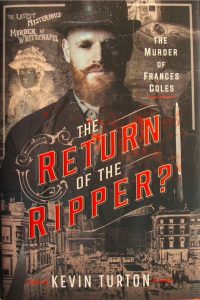According to record Dr Forbes Winslow believed he knew the identity of Jack the Ripper.
Who was he? I think perhaps the first criminal psychologist. I was attracted to his story when I researched Frances Coles and the whole Jack the Ripper legend. He was a man of wealth, took his father’s name, followed in the same medical footsteps and had a serious interest in mental illness. No crank, he became fascinated by murder and those who perpetrated it. So, when the Ripper murders began to be reported by the press he was drawn into the investigation, though not by the police. Any involvement by his profession in crime generally back in the late nineteenth century was seen more as a hindrance than a help. Something Forbes Winslow I’m sure would have a realised and maybe even accepted. But it did not stop him involving himself in the investigation whenever he could although generally that was through the media. Newspapers loved him, they sought his views and he gave them freely.
I think for him Jack the Ripper and the nature of the crimes he committed demanded a level of psychiatric analysis only he felt capable of providing. It wasn’t just the killing that fascinated him but the level of mutilation he inflicted on his victims after he had killed. For Forbes Winslow I think it fair to say he recognised in that a level of psychosis rarely seen and never before understood. A hallmark, if you like, which identified a certain character trait. Without realising it I think he was beginning to profile Whitechapel’s killer. He was not the only one, of course, others had tried. But maybe the good doctor’s conclusions were not so wide of the mark. For him Jack the Ripper was, as he put it, a man suffering from religious mania. A man with an obsession. One which drove him to violence. He was also a man living in and around Whitechapel. A killer that rented rooms near to where he killed and moved to other lodgings immediately after killing. He was also, thought doctor Forbes, a well made man, not a poor man. Someone able to fund his life style and a man who most likely kept trophies, articles he took from his victims.
All this he told police. I am sure they listened but they did nothing else. But Forbes never gave up. at the height of the killings, he believed he knew of rooms the killer had rented and of his church going habits. Again all information given to police and none of it, I would imagine, taken seriously. So Forbes Winslow, whether through frustration or anger, began to go out onto Whitechapel’s streets at night in the hope of either stopping the killer or at least better understanding just how the area functioned. By the later part of 1888 he had become a familiar face moving around the various pubs and lodging houses. Known to police and the women who often frequented them if not by name certainly by sight. Though as far as is known it brought nothing new to the investigation.
When the murders stopped his opinion was simply that the killer had moved away, not that he had died. Late in life he even offered up a potential name. A man he claimed who had sailed away to Australia and was still alive at the time living somewhere in South Africa. The story, in part at least, is verifiable and intriguing. But is it true?
Like all things Jack the Ripper nothing is ever as it seems but what Forbes Winslow did was offer up a captivating, fascinating notion that London’s serial killer was alive and well at the start of the twentieth century. That the murders, which he believed started with Martha Tabram and ended with Alice McKenzie, were never repeated elsewhere in the world. Jack’s manic psychotic desires had been satiated on Whitechapel’s dark, dirty streets and provided it stayed that way his anonymity was guaranteed.
Maybe he was right. I have my doubts. But nevertheless doctor Forbes Winslow’s involvement in the Jack the Ripper story is an important and, I think, often overlooked part. He may not have found the killer, may not even have got as close as he thought, but he did offer up a credible solution. All these years later it’s impossible to know just if he did ever get close or whether his theories really are a valid contribution to the unsolved Whitechapel cases of 1888.
I have examined some of his conclusions in more detail in, ‘Return of the Ripper? The Murder of Frances Coles,’ because I feel there is a relevance. The 1880’s were pretty desperate for a lot of people living in Whitechapel. Murder was a major problem throughout the whole decade and Forbes Winslow along with advances in police procedure helped shape policing at the start of the twentieth century. So, I feel he deserves a little credit.